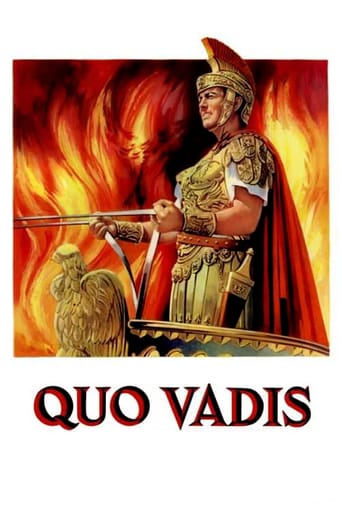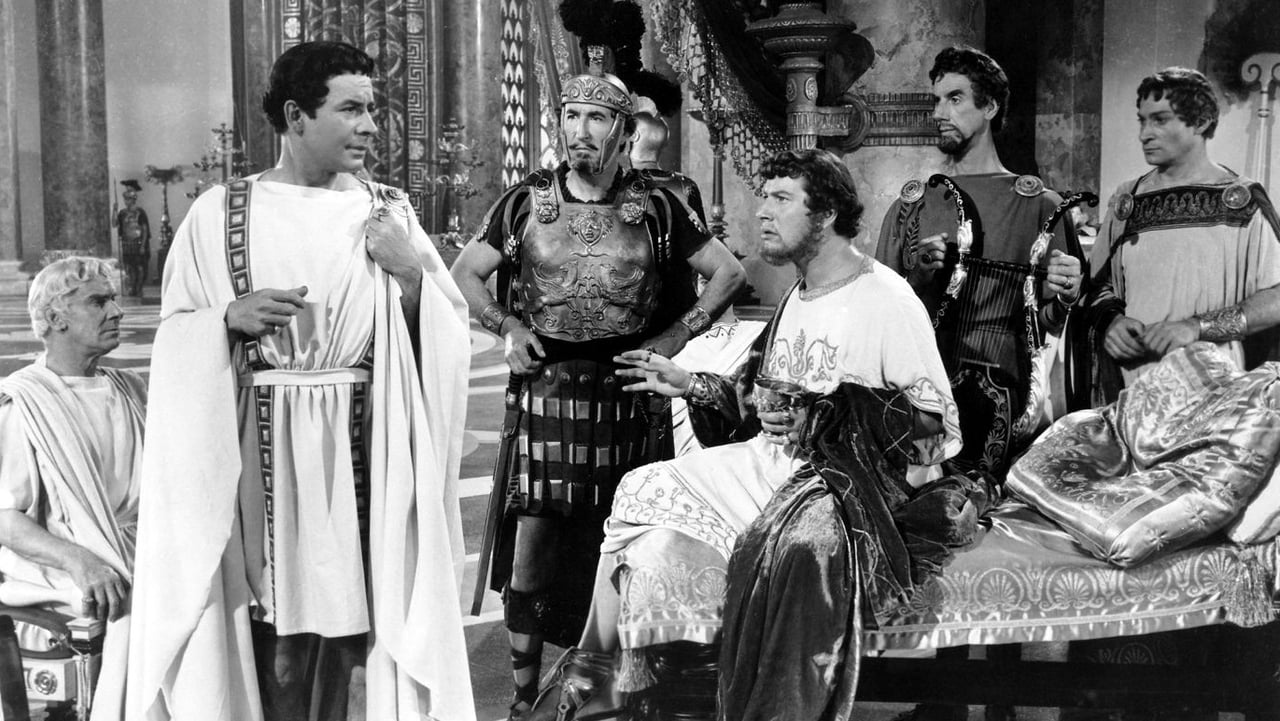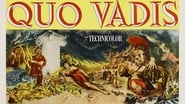JohnHowardReid
Copyright 4 December 1951 by Loew's Inc. An M-G-M picture. New York opening simultaneously at the Astor and Capitol: 8 November 1951. U.K. release: 28 September 1952. Australian release: 19 December 1952 (sic). Sydney opening at the Liberty. 171 minutes.SYNOPSIS: In the first century A.D., Marcus Vinicius, commander of the victorious Roman legions, returns to Rome after his conquests in Britain. He is honored by the Empress Poppaea. Soon he meets and falls in love with Lygia, a Christian hostage and the daughter of a defeated king. She spurns him because of his pagan ways. He the contrives to have Lygia given to him as a slave. But she still refuses to yield to him. Later Marcus follows Lygia to a meeting of the Christians where a sermon by the apostle Peter gives him a better understanding of her religious beliefs. She eventually falls in love with Marcus and consents to become his wife. However, he leaves her in anger when she refuses to abandon her Christian faith. Yet when the mad Emperor Nero sets fire to Rome, Marcus rushes to Lygia's rescue. NOTES: Negative cost: $7 million (including $2 million for an abandoned 1949 version produced by Arthur Hornblow and directed by John Huston, starring Gregory Peck and Elizabeth Taylor).Initial domestic rentals gross: $10.5 million, making it number 2 at the U.S./Canadian box-office for 1952. Equal 4th (with another Robert Taylor epic Ivanhoe) at U.K. ticket windows.Nominated for the following prestigious Hollywood awards: Best Picture (lost to An American in Paris); Best Supporting Actor, Leo Genn (lost to Karl Malden in A Streetcar Named Desire); Best Supporting Actor, Peter Ustinov; Best Color Cinematography (lost to An American in Paris); Color Art Direction (Also lost to An American in Paris); Film Editing (lost to A Place in the Sun); Music Scoring of a Drama or Comedy (also lost to A Place in the Sun); Color Costume Design (lost to An American in Paris).Number 8 in The Film Daily's annual poll of American film critics. Number 9 on the National Board of Review's Ten Best list.Filmed in Italy, at Rome's Cinecitta Studios.COMMENT: This, the first and only sound version of a once super- popular 1896 novel, inaugurated the Hollywood craze for spectacles. It established a formula, faithfully followed in most other epics of ancient and medieval pageantry: (1) Pots of money spent on sets, effects and costumes; (2) prestige actors in lead roles; (3) an always super-glossy but only occasionally imaginative technical finish; (4) an invariably weak script, often with quasi-religious shadings, in which one-dimensional characters muse at length in quaint English on the meanings of love, life, commitment and destiny.Quo Vadis is more entertaining than most of its successors. Although the love story is even more flaccid than usual — Miss Kerr makes her heroine boringly insipid — it does have some uncommonly strong performances, especially from Peter Ustinov, Leo Genn (this was the movie that made them both super-stars, though Mr Genn's reign proved less durable than the far more flamboyant Ustinov's), Patricia Laffan, Buddy Baer (his best role ever), and the ever-reliable Robert Taylor.On the whole, it's Ustinov who makes the most impression. His is by far the most colorful character. He has all the best business and lines — and makes the crowd-pleasing most of them!And of course there's the spectacle elements: richly vivid sets, hordes of extras, see Nero fiddling whilst Rome burns, Christians thrown to the lions, all that sort of stuff, expensively re-staged — and indelibly cheapened in the process. AVAILABLE on an excellent Warner DVD.
tomsview
I guess nostalgia would have to be a big part of my evaluation of a movie that is the earliest one I can remember. I must have been about 5-years old when I saw this in a suburban cinema in Sydney around 1952.Three things imprinted themselves: the slave being trampled as the legions march towards Rome; Ursus throwing Croton down the steps, and most vivid of all, Nero looking through the coloured glass ovals - I was a cheap date in those days.I have seen the movie many times since then, but it always seems like an old friend. Of course these days I am a little more discerning about its strengths and weaknesses.The story is gleaned from Henryk Sienkiewicz's slab of a novel, about an all-conquering Roman General, Marcus Vinicius (Robert Taylor), who falls in love with a Christian girl, Lygia (Debora Kerr), set against the backdrop of Rome during the reign of Emperor Nero (Peter Ustinov). It was a great period for an epic; we get massive triumphs - "Remember, you are only a man" - the burning of Rome, and the persecution of the Christians complete with human torches, crucifixions and of course lions - the ancient Romans knew a thing or two about showbiz.Robert Taylor made a very clean-cut, all-Roman kind of guy - he gives the role a suitable touch of arrogance, but his tunics look as though they have just come back from the cleaners, and they didn't spare the Napisan. Taylor seemed to breeze through these types of parts, but there are others who gave the film more gravitas.Deborah Kerr glows in her role, however it's the relationship between Petronius (Leo Genn) and his slave Eunice (Marina Berti) that I find the most touching - he orders her whipped, but not to damage her skin.Then of course there's Peter Ustinov as Nero. Charles Laughton had given Nero a certain piquancy in DeMille's earlier, "The Sign of the Cross", but Ustinov out-lyres him all the way. His Nero is maybe a little one-note; he plays him as a petulant teen possibly dealing with gender issues, but his death scene is pitiable, "Is this then the end of Nero?" There are some great lines in the film, nearly all shared by Petronius and Nero.I think the film is quite spiritual and uplifting when Finlay Currie delivers as Peter. Much of the film's spirituality also comes from Miklos Rozsa's soaring score - conversions are definitely on the cards when a theme such as "The Miracle and Finale" gets the full orchestral treatment.As a movie, "Quo Vadis" is the equivalent in painting to a monumental salon piece by Lawrence Alma-Tadema rather than a more intriguing and challenging work by El Greco or Picasso.However it has its moments with scenes that CGI would find hard to beat, and the Christians in the arena never fail to bring a lump to my throat. And you know what? I still love those coloured glasses.
James Hitchcock
"Quo Vadis?", based upon a novel by the Polish writer Henryk Sienkiewicz, might not be the film which launched the epic revival of the fifties and early sixties; that was probably DeMille's "Samson and Delilah" made two years earlier. It was, however, responsible for the popularity of epics dealing with the early history of Christianity and its persecution by the Roman Emperors; others include "The Robe", its sequel "Demetrius and the Gladiators", "The Silver Chalice", "Barabbas" and, of course, "Ben-Hur". The title (Latin for "Where are you going?") refers to an incident in which Saint Peter, fleeing from the persecutions of the Emperor Nero, was persuaded to return to Rome and face martyrdom by a vision of Christ. Although the only source for this non-Biblical story is the apocryphal "Acts of Peter", it has become part of Christian tradition, and is re-enacted in this film, in which both Peter and Nero are important characters. The main story, set against the background of the anti-Christian persecutions and the Great Fire of Rome, deals with the love of Marcus Vinicius, a Roman military commander, and the Christian girl Lygia. (Lygia is named after her native land, corresponding roughly to southern Poland. As it lay a long way outside the boundaries of the Roman Empire, it is unlikely a native of the region would have made her way to Rome, but the patriotic Sienkiewicz presumably wanted to make his heroine a fellow-countrywoman). As with most epics, the film often departs radically from historical truth. In the film the fire is started by Nero himself, encouraged by his wife Poppaea, an act which leads directly to his overthrow when the Roman populace realise that he, not the Christians whom he has falsely blamed, was responsible. Nero kills Poppaea shortly before his own suicide. In reality the Great Fire took place in 64 AD, four years before Nero's downfall. Poppaea died of unknown causes in 65; many historians now doubt contemporary reports that Nero was responsible for her death. At the time of his own death Nero was married to Statilia Messalina, who survived him. In reality the philosopher Seneca also died in 65 and the courtier Petronius in 66; here Seneca survives Nero and Petronius dies shortly before him. Lygia is made the adopted daughter of a retired general, Aulus Plautius, a real historical figure here presented as a devout Christian, .although there is no historical evidence for this. (His wife Pomponia was accused of following a "foreign superstition", which may or may not have been Christianity). These discrepancies, however, mostly derive from the original novel and cannot simply be dismissed as "Hollywood goofs". Like any good novelist, Sienkiewicz realised the importance of a good story, and the film-makers were right to follow his example. Any attempt to "correct" his "errors" and to make the film follow history more faithfully would merely have weakened the power of his story. One thing that might strike a modern viewer is a certain note of misogyny running through the film. Poppaea is a venomous shrew and the other main female characters all fall hopelessly in love with men who have mistreated them- Lygia with Marcus, who effectively kidnaps her, the slave-girl Eunice with Petronius, who has had her whipped, and Nero's former mistress Acte remains infatuated with him despite his treatment of her and his obvious villainy. The movie is dominated by the male characters; the only outstanding female contribution comes from Patricia Laffan as the evil Poppaea. Deborah Kerr, makes a weak, milk- and-water Lygia, more plaster saint than Christian heroine. The original intention was to cast the teenage Elizabeth Taylor in the role, and she might well have made Lygia more spirited. Robert Taylor, however, is fine as Marcus. Although officially the hero he is not, in the early part of the film, altogether sympathetic, and Taylor brings out the hardness and arrogance which have been inculcated in him by his pagan upbringing and which gradually soften under the influence of Lygia's Christian beliefs. Other good contributions come from Finlay Currie as Saint Peter and Buddy Baer as Lygia's gigantic bodyguard Ursus. (Coincidentally "Ursus" means "bear" in Latin and "Baer" has the same meaning in German). Leo Genn is also good as Petronius, a man who initially seems like a shameless flatterer of Nero, yet whose flattery hides some sage advice and who proves himself capable of courage when he realises that he can no longer restrain the Emperor's evil nature. I suspect that Peter Ustinov's Nero will divide viewers, even though at the time he was nominated for a "Best Supporting Actor" Oscar. (Genn was nominated for the same award). When I first saw the film I disliked his performance, thinking him too comical, effete and unthreatening. Having recently seen it again I have changed my mind; the historical Nero was probably much closer to the camp, childish, petulant, conceited and self-pitying wimp portrayed by Ustinov than to the ranting Hitler-style dictator which is how I had previously envisioned him. Ustinov makes us realise, as Chaplin did in "The Great Dictator", that tyrants can be ridiculous even at their most frightening. The one thing every epic needs to succeed is spectacle, and plenty of it. (One reason "The Silver Chalice" was such a flop is that its producers tried to dispense with this essential ingredient and make an epic on the cheap). And "Quo Vadis" has spectacle in spades. Even more than "Samson and Delilah", it started the trend for film-making on a grand scale which was to culminate in "Spartacus", "Ben-Hur" and "Cleopatra". The scenes of the Great Fire and of the games in the arena are particularly well done. I would not rate it quite as high as what I regard as the "Big Four" epics ("The Ten Commandments", "Ben-Hur", "Spartacus" and "El Cid"), but it is not far behind. 8/10
writers_reign
What a colossal bore. I've just spent the thick end of three hours watching at most - and being generous - three minutes of half-decent cinema. Presumably it was 'sold' as spectacle and if that's true then they really SHOULD have gone to Specsavers. What it is is TALK and then MORE talk and nothing worth hearing. It's just possible with two half-decent leads as opposed to the wooden Taylor and the insipid Kerr it might have been watchable, say Lancaster or Douglas opposite Ava Gardner. As it is the only diversion is looking for the uncredited Liz Taylor and/or Sophia Loren. Ustinov walks away with it of course but given the role as written even Arthur Mullard could have made a respectable stab at it. Finlay Currie and Felix Aylmer in one movie is also notable though not enough to make it watchable. Maybe if they'd turned the lions loose at the first pre-production session it would have done us all a fovour.



 AD
AD






